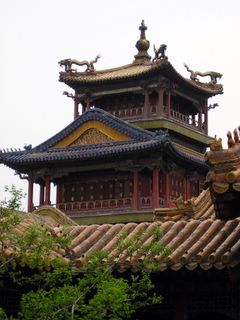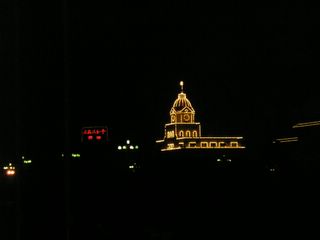Wednesday, August 20, 2008
Thursday, November 03, 2005
Mornings were lovely, brisk. We meandered through a park along the way and found ourselves entranced by gangs and gangs of old people, frolicking before the day's pollution could set into the skyline. One group beyond a grassy hillock exercised to ear-splitting Chinese aerobics music. Another on a pavilion practiced Tai Chi, another played badminton or hackey sac. One tall, narrow man, eschewing group activity, practiced walking backwards along the dipping, curving sidewalks woven through the trees, where others were installing caged birds on poles, brought from home. It stunned me to see so many people, let alone old people, outside, playing.
Personalities, quirks, oddments began to surface, as we sat and watched them for awhile. One stocky fellow in a natty red beret lofted his hackey sac around, pretending not to show off. Two white-headed ladies hit a shuttlecock badly back and forth, unperturbed by their lack of coordination. Another guy seemed to be a teaser, provoking people to laugh. I scoped out a gracile, silver-templed man smiling quietly among the hackey-sackers, elegant in dark blue wool sweater and slacks--then spied what must his lovely equivalent off dance stepping with a different co-ed group. I thought if those two didn't belong together, they should.

Watching them, I remembered every social dynamic of playing at the park when I was a child, as clearly as the smell of blades of grass. When I first came across concepts of friend, of pecking orders, of strangers turning into playmates, alliances won and lost, of hard lessons. The feeling of buoyancy at the transition from rising to falling, of laughter bursting from our swings in near collision and dissipating into the blue sky, of freefall down slides, of vapor trails watched and smelled from the ground up. The stomach-sickening activities of bullies, the fear no one would like me. Or arriving to find no one to play with.
It was all there in the older set, who became less and less old the longer I watched and more like all creatures who just set out into a young morning and eventually find their way into a day.
Most mesmerizing of all were the flowing movements of a Tai Chi Master, asocial, moving amongst the pavilion crowd, busy and noisy with its jumble of activity. His stance was so deep, he stayed so low pivoting, that I looked to see if his legs were shaking, straining. His face was serene, impassive. My mind began to flow in silent synchrony; soon I let go of the effort of wondering and became part of his undulating sweeping motions. I was a child again, sitting in the car at the train tracks, being swept away sideways with the train, though I knew I must still be sitting there on a park bench in Beijing, warming my hands with coffee.
Wednesday, November 02, 2005
Yangtze River Dispatch
 I’m floating down the Yangtze River right now, on a big lovely boat. For a communist country, they sure charge a lot for beer on this cruise. (Another Mao anomaly: a first class on the flight from Beijing to Chongquin, where the river trip begins). What’s up with that, comrade? As usual, I shuffled to the back with the peasants.)
I’m floating down the Yangtze River right now, on a big lovely boat. For a communist country, they sure charge a lot for beer on this cruise. (Another Mao anomaly: a first class on the flight from Beijing to Chongquin, where the river trip begins). What’s up with that, comrade? As usual, I shuffled to the back with the peasants.)Cans of beer and coke are four bucks a pop on the boat right now, water even more, which should tell you something about water here. This is quite a blow--large bottles of Tsingtao, we’re talking 630 tasty mils, set us back 17 cents in Beijing.
I’d never had a challenge drinking a dollar’s worth of beer, ever. After less than 50 cents of drinking I had to call Charlie and a few other friends on my cell to boast (Andy, the tri-band rocks!), raising the price per bottle to oh about $20 per call.
 The stacked, rolling hills are lovely against a backdrop of cloud-piercing mountain ranges. Every patch of green is terraced with vegetables, some on impossibly steep hillsides. How can people possibly garden at such harrowing angles? Can you see the terracing top left? Below are some vertical vegetables.
The stacked, rolling hills are lovely against a backdrop of cloud-piercing mountain ranges. Every patch of green is terraced with vegetables, some on impossibly steep hillsides. How can people possibly garden at such harrowing angles? Can you see the terracing top left? Below are some vertical vegetables. The Yangtze, the third largest river in the world, is a good 4 or 5 times wider than the Sacramento River and maybe a zillion times dirtier. I wasn't going to show this one, but oh well.
The Yangtze, the third largest river in the world, is a good 4 or 5 times wider than the Sacramento River and maybe a zillion times dirtier. I wasn't going to show this one, but oh well. Our safety debriefing crew told us, “If you fall overboard, wave your arms, wildly, like this! Scream for help. Loud as you can. Maybe fishermen going by. But they don’t speak English, so best you get is they enthusiastically wave back to you! Some might even say ‘hi’!”
Our safety debriefing crew told us, “If you fall overboard, wave your arms, wildly, like this! Scream for help. Loud as you can. Maybe fishermen going by. But they don’t speak English, so best you get is they enthusiastically wave back to you! Some might even say ‘hi’!” I’m sure my flesh would dissolve before a rescue raft could follow me overboard. As we float along, it’s bewildering, yet poignant, to see people crouching on flat rocks pounding their laundry with sticks and rinsing them in this muddy brown river.
I’m sure my flesh would dissolve before a rescue raft could follow me overboard. As we float along, it’s bewildering, yet poignant, to see people crouching on flat rocks pounding their laundry with sticks and rinsing them in this muddy brown river.
The visibility is disappointing, and I really don’t know how much is attributable to fog, how much to air pollution. We pass coal-bearing barges piled high and spilling over with the black stuff, soon to be transformed into the air and all our Made-In-China goods. (Cheap at what price?) We just passed a Buddha statue about 4-5 stories tall—whoah—near Feng Du, a legendary ghost city.
We just passed a Buddha statue about 4-5 stories tall—whoah—near Feng Du, a legendary ghost city.
A third of the way up the hillsides you can see red markers (in Chinese, of course) that show how high the water will rise once they finish damming it at the three gorges site downriver. Whole villages (displacing over a million residents), not to mention important archaeological sites, will go under within the next few years. Ten percent of the Chinese population will thus have damned electricity, to the tune of some $70 billion.
Looming upslope are skyscraper apartment cities. These living pods have electricity, plumbing, running water—not to mention washing machines—in contrast with the crumbling villages just below, where generations have lived in the same houses for centuries and villagers queue up to share one outhouse.
These doomed old villages are the soul of the river where the people work, trade, watch everybody’s business while leaning on their mud-brick window ledges. Those who have already “moved up” from their ancestral homes and farmlands experience amenity isolation for the first time in their lives. Progress. And here are more such cities, engineering without “soul” in the equation, just outside of Chongquin, along the riverfront–I’ll take a picture for you as we pass by.
And here are more such cities, engineering without “soul” in the equation, just outside of Chongquin, along the riverfront–I’ll take a picture for you as we pass by.
 Occasionally I do see caves and intriguing round houses built into the mountainside and charming pagodas and temples dotted along the hills. My guidebook says we passed a cave site that has 500 carved Buddha statues. I wish we could stop and explore all the caves–before the Buddhas drown and come back in their next life as pebbles.
Occasionally I do see caves and intriguing round houses built into the mountainside and charming pagodas and temples dotted along the hills. My guidebook says we passed a cave site that has 500 carved Buddha statues. I wish we could stop and explore all the caves–before the Buddhas drown and come back in their next life as pebbles. Chongquin itself had a fine skyline, I feel obliged to say. Our overhappy overtalkative tour agent tormented us with centuries’ worth of history and admirable things on our five-minute drive through the city. From the airport, she informed us we were headed to a Szechuan restaurant, since we were in the very heart of spicy China, before being released at the boat dock.
Chongquin itself had a fine skyline, I feel obliged to say. Our overhappy overtalkative tour agent tormented us with centuries’ worth of history and admirable things on our five-minute drive through the city. From the airport, she informed us we were headed to a Szechuan restaurant, since we were in the very heart of spicy China, before being released at the boat dock. Hers was the very kind of spirit to fill the youth Red Guards uniform decades ago, during the “Cultural” Revolution. I was afraid to let her stop talking at us. (To be fair, the guide who pulled us off the boat at the other end and shipped us to our next airport, was sweet and sweetly verbally spare.)
Hers was the very kind of spirit to fill the youth Red Guards uniform decades ago, during the “Cultural” Revolution. I was afraid to let her stop talking at us. (To be fair, the guide who pulled us off the boat at the other end and shipped us to our next airport, was sweet and sweetly verbally spare.)
This dinner in Chongquin was acutely embarrassing but the most delicious meal I had in China. We arrived around 9:00 p.m., unwashed and way underdressed, when most guests were leaving. The establishment was festooned with red banners and round lamps, carved cherry woodwork, very cheery Chinese. The management kept the entire staff there, the first ominous sign, while Jackie and I sat down to our first authentic Szechuan feast—the famous hotpot.
What an extravaganza of vegetables and meats and delicacies–six or seven attendants bearing dishes took turns hurling morsels into bubbling broth (the pot is situated in the middle of the table, the gas heating elements below the table). These swirling delicacies we fished out with our chopsticks to dip into lovely sauces, while pressing our attendants into fetching more, and yet more, beer, to wash it all down.
Unaccustomed to royalty treatment, and ill-equipped to play the “rich American tourist” card, I anxiously peered round to the kitchen and noted young women standing around, staring off, tapping fingers or feet, their complement of boys pacing and jumping off things outside our window in the darkness, shouting, getting attention.
I tried to communicate to the people in charge to let their people go. I got uncomprehending stares and yet more delectable things in return. We felt compelled to enjoy it all. The muddly brown river is yielding now to cleaner green water and steeper, wilder mountains. Time to leave urban thoughts behind.
The muddly brown river is yielding now to cleaner green water and steeper, wilder mountains. Time to leave urban thoughts behind.
At seven this morning I joined some people doing Tai Chi on the top open deck, shy at first at jumping in. Tai Chi is best described as a meditative martial art. My body caught onto the movements quickly, thanks to ten years of hard karate training. Our leader wore a royal blue silk outfit that stood in sharp relief against misty river mountains.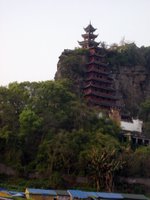 Ah, looks like the sun is trying to poke through, just in time for us to pull over and hike up Jade Seal Hill to Shiboazhai Temple. I hope the inevitable souvenir hawkers will have among their wares cheaper cans of Tsingdao beer for me to haggle over. I’d love to bring a whole case of souvenirs back to the boat, to hell with American-style beer pricing.
Ah, looks like the sun is trying to poke through, just in time for us to pull over and hike up Jade Seal Hill to Shiboazhai Temple. I hope the inevitable souvenir hawkers will have among their wares cheaper cans of Tsingdao beer for me to haggle over. I’d love to bring a whole case of souvenirs back to the boat, to hell with American-style beer pricing. Have souvenirs--will travel!
Have souvenirs--will travel!
I’m sitting in the upstairs portion of a bar, now; below is an acupuncture demonstration. A volunteer from the cruise is onstage, hoping that being stabbed with long thin needles will take her mind off some neck and shoulder pain. Somehow being lanced through acupuncture points along a particular meridian will straighten out whatever yin-yang issues are causing her trouble. I’m hoping he can find these elusive meridians under her copious white American flesh.
Our doctor inserts, oh, twenty, thirty needles, one at a time, sloooowly, of course. She tells us it feels, not quite like a bee sting, rather like intense pressure. The doctor says to the porcupine, “The pain you feel, it is from longtime stiffness, so hopefully needle gradually open up and unblock your energy channel.”
As he probes her troublesome meridian and inserts another foot-long needle I pray to the river gods for no turbulence. We are on a boat on a rushing river, after all. But thinking back to Tai Chi guy balancing on one foot while crouching in some animal shape, without the slightest tipple, I know these Chinese guys have intense control. Jackie and I found an opportunity to offend our kind hosts, on this very same stage, when the crew sent out word for a talent show one evening. We performed kanku dai, an advanced black belt kata, for the crowd. Anything remotely Japanese is vile to the Chinese people. The MC introduced the next act, after a courteous bordering on curt thank you and dismissal.
Jackie and I found an opportunity to offend our kind hosts, on this very same stage, when the crew sent out word for a talent show one evening. We performed kanku dai, an advanced black belt kata, for the crowd. Anything remotely Japanese is vile to the Chinese people. The MC introduced the next act, after a courteous bordering on curt thank you and dismissal. 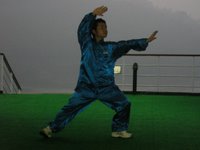
“And next we have our own Tai Chi Master and onboard masseuse, ‘Magic Hands’ to demonstrate for you the beauty of Chinese culture and martial arts, the true superiority of Chinese ingenuity in the martial art and in fact in all the arts.”
And it was true, Mr. Blue Silk did some kung fu sword fighting dance that sent him spinning sideways through the air, making me want to call him Mr. No Gravity Magic Feet, too. It was more beautiful compared to the linearity and blunt force of Japanese punching and kicking. But which one kicks more ass, huh?

As the river narrowed, the water got even greener, the landscape more luxuriant, I marveled at being on this ancient waterway, in a landscape so rugged and remote in the midst of the most populous country on earth.
Tuesday, October 04, 2005
Frolicking in the Summer Palace

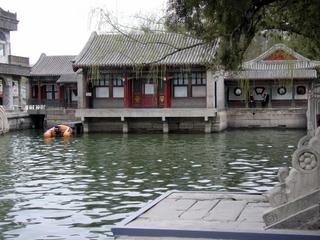
Frolicking in the Summer Palace
Outside Beijing is the Summer Palace, whose giant lakes, pagodas, marble bridges, art-bedecked corridors, and endlessly ornate halls are now open to the marauding public. Empress Cixi, a girl after our own hearts, embezzled funds, with assistance from a corrupt eunuch, from the Chinese Navy in the late 1800s to rebuild these palatial stomping grounds, devastated by the many fires of military incursion.
Floating on Kunming Lake is a giant pleasure boat Cixi had made--of giant slabs of marble; one wonders how it didn’t sink with all of Qing Dynasty’s cash.
One shouldn’t mess with the Cixi. Back in the Forbidden City is a well where she had a usurping concubine drowned.
Now military boys guard and protect all of China’s treasures. But they are distractable-–less at a place like Tianenmen Square, mind you, but certainly more in the atmosphere of leisure and pleasure that exudes at the Summer Palace. I’m guessing that the Summer Palace is one of the preferred tours of duty.
Because we were traveling in the off-season, my pink face and blondish head rose in stark relief against a sea of dark-haired peoples dressed in their dark travel suits. (With a little more tangible wealth, perhaps, the Chinese are now China’s biggest tourists; and one can see in the way they dress that touring is an honor, either that or the Chinese simply don’t dress like slobs. Aside from their habit of spitting everywhere, I’d much rather flow among the monuments with this more respectful kind of crowd.) First, my fellow travelers would look…up…and then they’d look…down (or eye-level, depending). I soon learned the Chinese have no qualms about staring.
 All over China, my Tang dynasty breasts had become their own tourist attraction (the Tang Dynasty having its golden age during our late medieval period, during which ostentatious good wealth, health, and thus voluptuousness were in vogue).
All over China, my Tang dynasty breasts had become their own tourist attraction (the Tang Dynasty having its golden age during our late medieval period, during which ostentatious good wealth, health, and thus voluptuousness were in vogue).Gaggles of civilian men would file by, stop, turn, whisper, then raise their cameras, all smiles and supplicating gestures. “Sure,” I’d say, gamely holding out my hand to take a group picture for them. Before I knew it, I'd be swarmed and click! I was surrounded and captured on Kodak before I could toss back my locks or suck it in.
The military boys were more discreet in their tactics. Mere babes in arms, they presented a fine sense of order with their pressed olive green uniforms, but one couldn't help notice the curious, dark eyes large and soft as teardrops peering out from under their stiff military caps.
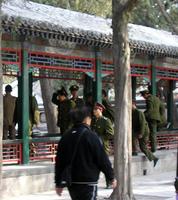 After a bit of marching, one would spontaneously leap out of line over a little wall, and the rest of the line would follow suit like ducklings, hop, hop, hop. Then more marching in unison, until one again fell out of formation to pose for a photo op at some monument, the others tumbling around, completely forgetting themselves until a snap-to order from the rank leader summoned them back into line.
After a bit of marching, one would spontaneously leap out of line over a little wall, and the rest of the line would follow suit like ducklings, hop, hop, hop. Then more marching in unison, until one again fell out of formation to pose for a photo op at some monument, the others tumbling around, completely forgetting themselves until a snap-to order from the rank leader summoned them back into line. Delighted with this playful slipping in and out of order, I pretended to frame their monuments, sneaking snaps of the boys posing in the foreground, or I’d pretend to pose while Jackie pointed the camera over my shoulder instead of at me.
Delighted with this playful slipping in and out of order, I pretended to frame their monuments, sneaking snaps of the boys posing in the foreground, or I’d pretend to pose while Jackie pointed the camera over my shoulder instead of at me.Curiously, the military formation seemed to be keeping up with us wherever we were going, now jumping ahead, now falling back. I realized they were subtly returning the volleys. I haven’t had that much subversive fun since I was in my 20s. These youths couldn’t have been more than 18-21 years old themselves–that’s the required period of military service in China.
Once I was standing on these arched white steps to a pagoda. I paused briefly then moved on before the boys could discreetly whip out their cameras from their military trousers and snap their pictures.
Their groan of disappointment was audible, because by then the game was understood. I was not being a fair player. Thus ensued a photo intrigue from one pagoda to the next, with more advanced tactics. Some were emboldened to run up and stand near me, shoulders straight, hands clasped behind, gazing off in the distance while their picture was taken, others crouched, waiting impatiently to run up and pose for the same sneak snap, until we moved on.
Our flirtation ended, sadly for me, when Jackie decided to just march right up to them and plant herself in the middle of the unit for a group picture. Then I jumped into the fray, trying my best to strike a pose.
I wish I’d had time to remove my bulky money belt from my waist first—but no, that wouldn’t have been very Tang Dynasty of me. We then went our separate ways. The rest of my stay at the Summer Palace somehow felt anticlimatic.
 But this was just the beginning for my military boys.
But this was just the beginning for my military boys.I wonder how those Tang boobs will look plastered on The Peoples' barracks’ walls.


